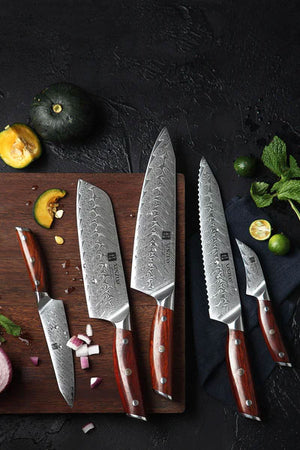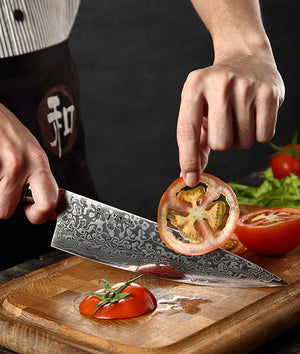Steel Cheese Knives
Some people view cheese knives as being a little bit excessive – because, you could use pretty much any kind of knife to cut something as basic as cheese, right?
Well, yes and no. While it may be true that various types of knives are capable of cutting cheese, this doesn’t mean that they should be cutting cheese. There are two reasons for this – one, it may not cut the cheese very well, producing unclean slices... Show More
Some people view cheese knives as being a little bit excessive – because, you could use pretty much any kind of knife to cut something as basic as cheese, right?
Well, yes and no. While it may be true that various types of knives are capable of cutting cheese, this doesn’t mean that they should be cutting cheese. There are two reasons for this – one, it may not cut the cheese very well, producing unclean slices and ruining the remaining block of cheese. And two, it may not be good for the knife.
With this in mind, we purport that if you’re somebody that eats cheese regularly, you need a cheese knife. While there are a few different options when it comes to different types of cheese knives, varying mostly in blade type and material, today, we’re focusing on steel cheese knives.
We’re going to fill you in on the ins and outs of cheese knives – that is, their most important characteristics – and the different blade materials you can choose from. That way, you can find the best cheese knives for your kitchen.
Properties of a Cheese Knife
Cheeses vary dramatically, so it only makes sense that cheese knives would too. Even so, we’re going to tell you about their most important properties and how they may differ.
- Blade Type: Common blade styles include a cheese plane (flat, wide blade for harder cheeses); cheese cleaver (thick, heavy blade from hard and crumbly cheese); and an open-work blade knife (a thin blade with holes in it for soft cheese).
- Blade Length: Normally short, between four and six inches.
- Cutting Edge: Sharp, to ensure clean cuts and less cheese sticking to the blade.
- Serration: The edge may or may not be serrated – this is better for softer cheeses.
Those are the ways in which cheese knives vary. But what about the material from which the blade is made?
Different Cheese Knife Blade Materials
Most knives can be made from a variety of different materials, and in theory, cheese knives can too. However, in reality, most cheese knives are made from some variation of stainless steel. So, if you’re looking for a cheese knife, stainless steel is probably what you’re going to find.
Why are stainless steel cheese knives preferred to other types of blade materials?
Well, stainless steel is known for being resistant to corrosion – that is, it’s far less likely and less prone) to rust and degrade than many other materials, such as carbon steel or even high-carbon steel. Other materials may be stronger, but they’re far more susceptible to corrosion.
This is particularly important for cheese knives because cheese is moist – thus, if the blade is made from a material that will corrode easily, the quality will deteriorate quickly and the knife won’t last as long as it should.
Buy a Stainless Steel Cheese Knife From Us Today
So, if you’re looking for the best cheese knives, shop with the Bamboo Guy and view our selection of cheese knives today.
Show Less
Filters
-
Original price $41.95Original price $41.95 - Original price $41.95Original price $41.95Current price $27.50$27.50 - $27.50Current price $27.50| /
Xinzuo B35 German Stainless Steel Red Sandalwood Kitchen Multi-Use Cake Cheese Knife
In stockXinzuo B35 Kitchen Cheese Knife Features: German Din 1.4116 Stainless Steel 56-58 HRC Rockwell hardness Edge angle: 30 degrees Rust resistant Red ...
View full detailsOriginal price $41.95Original price $41.95 - Original price $41.95Original price $41.95Current price $27.50$27.50 - $27.50Current price $27.50| /Save 34% Save % -
Original price $56.95Original price $56.95 - Original price $56.95Original price $56.95Current price $37.50$37.50 - $37.50Current price $37.50| /
Xinzuo X02 Supreme Series 6" Serrated Tomato Knife German 1.4116 -x50crmov15 Steel - Full Tang
In stockXinzuo Supreme Series - Precision, Durability, and Timeless Craftsmanship Crafted from premium German 1.4116 stainless steel (X50CrMoV15), the Xinz...
View full detailsOriginal price $56.95Original price $56.95 - Original price $56.95Original price $56.95Current price $37.50$37.50 - $37.50Current price $37.50| /Save 34% Save % -
Original price $56.95Original price $56.95 - Original price $56.95Original price $56.95Current price $37.50$37.50 - $37.50Current price $37.50| /
Xinzuo X02 Supreme Series 6" Cheese Knife German 1.4116 -x50crmov15 Steel - Full Tang
In stockXinzuo Supreme Series - Precision, Durability, and Timeless Craftsmanship Crafted from premium German 1.4116 stainless steel (X50CrMoV15), the Xinz...
View full detailsOriginal price $56.95Original price $56.95 - Original price $56.95Original price $56.95Current price $37.50$37.50 - $37.50Current price $37.50| /Save 34% Save %











